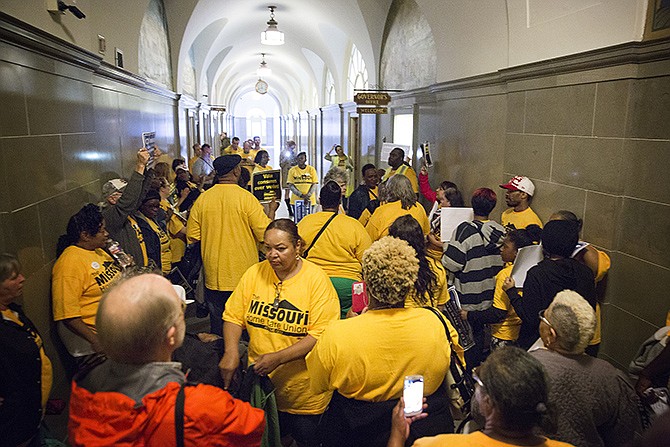EDITOR'S NOTE --- This story was changed at 3:30 p.m. Thursday, May 21, to change Jeff Mazur's organization connections, which were reported incorrectly in the previous version.
Missouri Home Care Union members and their supporters stood outside Gov. Jay Nixon's Capitol office for more than an hour Wednesday, urging him to order their new contract be put in place.
Their chants included: "Home Care workers, home care consumers, want to know, why this contract's moving slow" and "Contract signed, contract sealed, time to deliver ..."
More than 75 percent of the nearly 2.76 million Missourians voted in 2008 for a law creating an 11-member Missouri Quality Homecare Council to maintain a registry of home health providers available to help disabled and elderly people remain in their homes.
The proposition also allowed home health attendants to unionize.
Last December, the union completed negotiations for a wage increase, agreeing to let clients in the Consumer Directed Services (CDS) Program set the wages at between $8.50 and $10.15 an hour.
Those attendants currently are paid by vendors, who act as job clearing houses and bookkeepers, but not as employers, union members said.
"Missourians have the authority to approve that contract, because they voted for the Missouri Home Care Union and for the Missouri Quality Home Care Council," said Elizabeth Travis of Columbia, a home care attendant who works with five consumers through two different vendors. "We all got together - made up of attendants and consumers, the state department and vendors - everyone was involved.
"It wasn't an arbitrary contract that was just thrown together by people who didn't know what they were doing."
Wednesday's demonstration, which organizers said attracted nearly 80 protesters, came a week after the Legislature's Joint Committee on Administrative Rules rejected the Health and Senior Services department's proposed rule that would have activated the contract.
By a 7-2 vote on May 12, JCAR lawmakers determined the department doesn't have the authority to propose raising the base wage for CDS Program home health attendants.
"The governor supports the wage range provision of the labor agreement that provides a pay raise for home health care workers," Channing Ansley, Nixon's communications director, told the News Tribune Wednesday.
In order to be sure the agreement's provision "would have the full force and effect of the law," Ansley added, "the administration is working to implement the wage range recommendation through an administrative rule."
Travis was part of a group that met Wednesday with Emily Kalmer, Nixon's deputy legislative director.
"What we need are answers," Travis said. "We need to know why this is being held up - (the agreement) covers a lot of things that are very important to consumers and attendants."
While they hope to meet soon with other Nixon officials, Travis added, the group is certain Nixon "knows what he can do ... is the man who can make the decision to move forward, and how best to do that."
Robert Minor, chair of the Kansas City Workers' Rights Board of the group Missouri Jobs With Justice, also attended Wednesday's meeting with Kalmer.
"Our concern is, this is not about these workers," he explained. "This is about all of us - you and me - who are going to probably need these services. We want to make sure that this is a stable workforce - they're the ones going to be in our homes helping us."
Minor said the contract is legal and already has been signed "and, therefore, needs to be implemented. I believe that the governor knows what to do."
Jeff Mazur, co-chair of the Missouri Home Care Union and executive director of AFSCME Council 72, helped organize Wednesday's demonstration.
"The governor has the opportunity to do what he needs to do, in order for a low-paid workforce to get a few rights and a small, modest pay increase to do that," Mazur said. "The state, for 15 years, implemented in this program a wage standard without a rule (or) statute - strictly on the authority of the agency to contract with the vendors."

